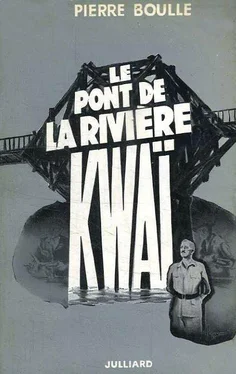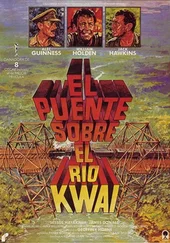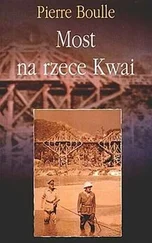“Four rows of piles,” Shears muttered. “That’s a big job, you know. Why the hell couldn’t they build this bridge of theirs like all the other ones?”
“How far apart are the piles in each row?” asked Warden, who liked to have exact figures.
“Ten feet.”
Shears and Warden silently made mental calculations.
“We’ll have to allow for a length of sixty feet, to be on the safe side,” Warden finally observed. “That makes six piles per row, in other words, twenty-four to ‘prepare.’ It’ll take some time.”
“We could do it in a night, sir, I’m certain. Once we’re under the bridge there’s nothing to worry about. It’s wide enough to give ample cover. The water washing up against the piles muffles any other sound. I know ”
“How do you know what it’s like under the bridge?” Shears asked, gazing at him with renewed interest.
“Just a moment, sir. I haven’t told you the whole story. I went and had a look myself.”
“You went underneath it?”
“I had to, sir. You told me not to get too close, but that was the only way I could get the information I wanted. I climbed down from the observation post, on the blind side of the hill from the river. I felt I couldn’t let this opportunity slip through my fingers, sir. The Siamese took me along some wild boar tracks… . We had to move on all fours.”
“How long did it take you?”
“About three hours, sir. We set off in the evening. I wanted to be in position by nightfall. It was a risk, of course, but I wanted to see for myself…”
“It’s sometimes not such a bad idea to put your own interpretation on the orders you’re given,” said Number One, as he glanced across at Warden. “You got there, anyway—that’s the main thing.”
“No one saw me, sir. We came up on the river about a quarter of a mile upstream from the bridge. Unfortunately, there’s a small native village tucked away there; but everyone was asleep. I sent the guides back. I wanted to reconnoiter on my own. I slipped into the water and floated down with the current.”
“Was it a clear night?” asked Warden.
“Fairly. No moon; but no clouds, either. The bridge is pretty high, they can’t see a thing…”
“Let’s get things in their proper order,” said Shears. “How did you approach the bridge?”
“I floated down on my back, sir, completely submerged except for my mouth. Above me…”
“Damn it all, Shears,” growled Warden, “you might think of me when a mission like this crops up again.”
“I’ll probably think of myself first if there ever is another one,” Shears replied.
Joyce described the scene so vividly that his two companions succumbed to his own enthusiasm and felt really disappointed that they had missed this part of the fun.
It was on the very day Joyce reached the observation post, after three nights’ exhausting march, that he had suddenly decided to do the reconnaissance. He had not been able to wait a moment longer. After seeing the bridge almost within arm’s reach, he felt he simply had to go and touch it with his hand.
Flat on his back in the water, unable to make out a single detail in the solid mass of the banks, barely conscious of being carried downstream, and unaware of the current, his only landmark was the long horizontal outline of the bridge. It stood out black against the sky. It grew larger as he approached it, soaring up into the heavens, while the stars above him dipped down to meet it.
Under the bridge it was almost pitch dark. He stayed there for some time, hanging motionless onto a pile. Up to his neck in the cold water w Thich still did not cool him down, he gradually managed to pierce the darkness and distinguish the strange forest of smooth trunks emerging from the surrounding eddies. It was no surprise; he was equally familiar with the view of the bridge from this angle.
“It’s worth having a shot at it, sir, I’m sure. The best thing would be to float the charges down on a raft. It wouldn’t be seen. We’d be in the water. Under the bridge there’s nothing to worry about. The current’s not strong enough to stop us swimming about between the piles. We could tie ourselves on, if necessary, to avoid being carried away. I went right across and measured the beams, sir. They’re not very thick. Quite a small charge would do the trick—under the water. It’s thick, muddy water, sir.”
“We’d have to place them fairly deep,” said Warden. “The water might be clear on the day of the attack.”
He had done all the necessary groundwork. For over two hours he had sounded the piles, measuring them with a piece of string, calculating the gaps between them, making a note of the ones which would cause the most damage if destroyed, engraving in his mind every detail which might be of use in the plan of attack. On two occasions he had heard heavy steps above his head. A Japanese sentry was patrolling the platform. He had crouched against a pile and waited. The Jap had vaguely swept the river with an electric torch.
“Our only worry while we’re approaching the target, sir, is if they light a lamp. But once we’re under the bridge you can hear them coming a long way off. The sound of their footsteps is magnified by the water. That gives us plenty of time to make for one of the central piles.”
“Is the river deep?” asked Shears.
“Over six feet, sir. I dived to the bottom.”
“How would you set about it?”
“Here’s my idea, sir. I don’t think we can rely on an automatically detonated fog signal. We couldn’t camouflage the charges. The whole works will have to be underwater. A long piece of electric wire running along the river bed and coming out on the bank—the right bank, sir, where it would be hidden by the undergrowth. I’ve found the ideal spot for that—a strip of virgin jungle where a man could easily lie up and wait. And there’s a good view of the platform through a gap in the trees.”
“Why the right bank?” Shears broke in with a frown. “That’s the side where the camp is, unless I’ve got it all wrong. Why not the opposite bank, by the hill? It’s covered with thick undergrowth, according to your report, and it would obviously be our line of withdrawal.”
“That’s quite true, sir. But just have another look at the map. After this wide bend here, the railway winds right around the hill after passing the bridge and then comes downstream along the river. The jungle’s been cleared between the line and the bank, and the ground’s quite open. There’s not enough cover in daylight. You’d have to lie up much further back, on the other side of the embankment at the foot of the hill. That would need too much wire, sir, and it couldn’t be camouflaged where it crosses the line, at least not without a great deal of trouble.”
“I’m not too keen on the idea,” said Number One. “Why not the left bank, but upstream from the bridge?”
“The bank’s too high, sir, there’s a steep cliff. And further up still there’s that small native village. I went and had a look. I crossed the river again, and then the line. I made a slight detour to keep under cover and came back upstream from the bridge. It can’t be done, sir. The only decent spot is on the right bank!”
“Good heavens!” exclaimed Warden. “You must have spent the whole night wandering around the bridge.”
“Just about. But I was back in the jungle by first light and reached the observation post early in the morning.”
“And what’s your plan for the chap who has to lie up on the right bank?” asked Shears. “How does he manage to get away?”
“It wouldn’t take a good swimmer more than three minutes to get across. That’s how long it took me, sir; and the explosion would distract the Japs’ attention. I think a rear party posted at the foot of the hill could cover his withdrawal. Once he’s across the bit of open ground and on this side of the line, he’s safe. A search party would never catch up with him in that jungle. I’m sure that’s the best plan.”
Читать дальше











